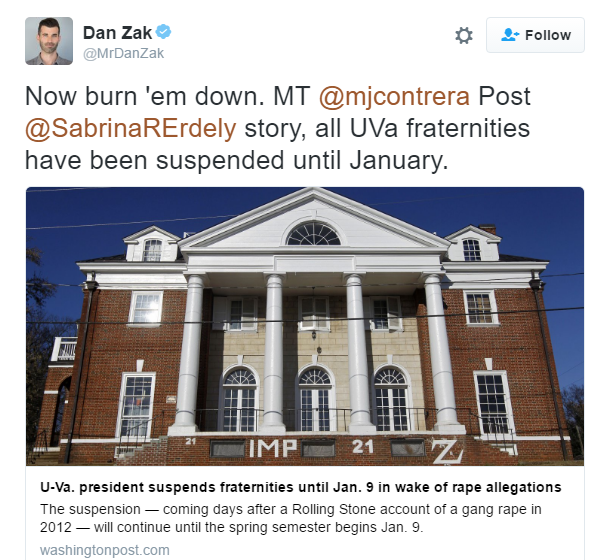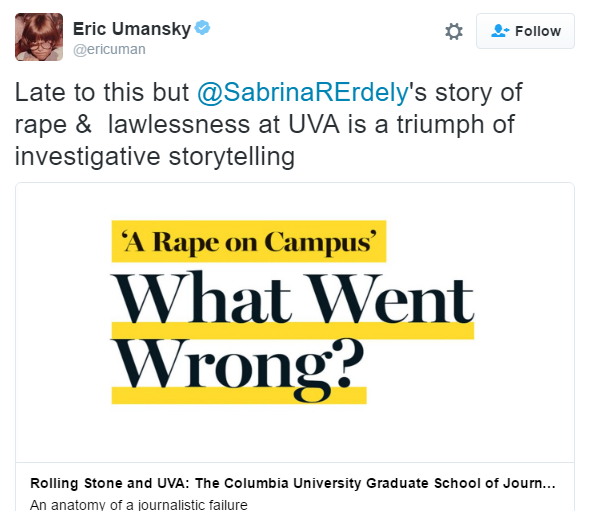Regardless of their impact on Dean Eramo’s lawsuit, the release of the Rolling Stone affidavits leave little doubt that Sabrina Rubin Erdely isn’t a very good reporter. She had her thesis—existence of a campus “rape culture”—in advance. As Cathy Young noted, the spine of the article, Jackie’s story, “had more red flags than a Soviet military parade.” Yet as Jackie was unwilling or unable to answer key questions, Erdely, a true believer, plowed ahead. And even the discrediting of Jackie’s story didn’t shake Erdely’s confidence in her thesis. In her affidavit, she suggested that if she learned that Jackie had invented the tale, she just would have substituted the experience of another person she had decided was a victim, “Stacy,” as the central vignette.
Earlier today, Worth editor Richard Bradley found it “fascinating to read some of these pre-debunking tweets.” I took a look. He’s right. It’s easy to see how people could have been horrified by the article. But it’s remarkable to observe how many high-caliber editors and reporters praised the quality of Erdely’s journalism. It seems their agreement with Erdely’s thesis blinded them to her flaws—a consistent problem in how most of the mainstream media has approached campus sexual assault.
It’s worth reiterating: Bradley, along with Robby Soave, expressed doubts about Erdely’s work from the start. And within a couple of weeks, the Washington Post (with assists from the Daily Caller and a disastrous Erdely appearance on Slate’s DoubleX podcast) had done the reporting Erdely had not. The overwhelming tendency to praise her reporting, therefore, is notable.
Three categories stand out:
Praising the Caliber of Erdely’s Journalism
Jeffrey Toobin, staff writer at the New Yorker and CNN legal analyst, tweeted to Erdely: “You did amazing work, a real public service.” “Great journalism,” he added.
“Fantastic reporting,” gushed Nina Gregory, senior editor on the arts desk at NPR. New York contributing editor Marin Cogan described the piece as “easily one of the best pieces of journalism I’ve read this year.” NBC’s Luke Russert hailed this “extraordinary piece of journalism.” Voactiv’s Susie Banikarim recommended this “important and very well-reported piece on rape culture.” The normally even-handed Richard Deitsch, of Sports Illustrated, expressed “thanks” to Erdely for “her reporting.”
Among editors: Eric Umansky, deputy managing editor at Pro Publica, deemed Erdely’s article—which he said had exposed “lawlessness”—“a triumph of investigative storytelling.” Philadelphia Magazine’s featured editor Richard Rhys described Erdely’s work as “mag[azine] journalism at its best.” BuzzFeed deputy culture editor Karolina Waclawiak celebrated Erdely’s “brilliant reporting.”
Steven Ward, the news director at the Clarion-Ledger, hailed Erdely as a “superstar” who exposed “rape culture at UVA.” For widely published freelance reporter Alex Suskind, Erdely’s article was “required” reading. Former Gawker editor Maggie Shnyarson remarked, “I’d love to get my hands on those little shits.” She presumably wasn’t referring to the campus activists who uncritically championed Jackie’s story.
A tweet from Atlantic’s Jeffrey Goldberg deeming Erdely’s reporting “amazing” survives. But Goldberg had another, presumably more detailed, tweet, in which he also passed along the link to the article. Erdely thanked him for it; many people responded to it. But the tweet has vanished from his timeline.
Calls to Action
David Beard, executive editor for Public Radio International (and formerly of the Washington Post) had a message for Erdely: “You are making change happen. This editor thanks you.” “Thank you, David,” Erdely replied.
Retweeting a Washington Post article on UVA president Sullivan’s decision to suspend all fraternities at the school, Post reporter Dan Zak had a blunt message: “Now burn ‘em down.” Imagine the (appropriate) outrage if—under any circumstances—a Washington Post reporter had publicly advocated burning down a Multicultural Center or a Women’s Center after an allegation that some of their students had committed misconduct.

Neal Rogers, U.S. editor-in-chief of Cycling Tips, said that after reading Erdely’s article, he wanted to “‘rush a frat’—with a semiautomatic.”
The New York Times
The Times has led the way in flawed reporting of campus sexual assault, so it was little surprise to see several of its reporters praise Erdely’s work.
Jessica Lustig, deputy editor at the Times Magazine, commented on how, after Erdely’s “devastating” report,” UVA suspended all fraternities. Times tech policy reporter Celia Kang likewise gave her “kudos” to Erdely, after her “deeply reported” article led to the suspension of all UVA’s fraternities. Times Sunday Styles reporter Katie Rosman also praised Erdely’s role in getting the fraternities suspended: “THIS is a journalist affecting change,” she wrote.
Times business columnist Claire Martin hailed the “incredibly well reported” article. Times political reporter Ashley Parker shared a link to the “devastating” article, which exposed the “culture of rape” at UVA, to people on her twitter feed. David Dobbs, who has written features and essays for the Times, almost sounded like an Erdely fan-boy: “Incredibly good and important work there, Sabrina,” he gushed. “Deep bow to you. Splendid, vital reporting and writing.”
Erdely’s Responses
Before her piece was discredited, Erdely responded to some of the praise. She also offered her own additional analysis. “Not to state the obvious,” she noted on November 22, 2014, “but enlightened men are key to fixing the rape epidemic. It’s so good to have you on board. Let’s recruit more.” (Meanwhile, she deemed herself “shocked” by the phenomenon of “women perpetuating rape culture.”) The next day, she anticipated a movement, hoping “that fraternities at UVA & elsewhere will embrace this as an opportunity to be leaders in turning the tide against rape.” Administrators needed to get in on the act, as well, since the “scary truth is, the culture of rape and impunity is hardly limited to UVA. Every school should be taking a hard look at itself.” And Erdely deemed it a “good time” for “very, very rich” alumni to pressure the UVA leadership.
A final note. Because Rolling Stone replaced Erdely’s article with the Columbia Journalism Review’s (partial) autopsy of the magazine’s editorial failures, reporters whose tweets included an embedded URL now look like the below.


Somehow fitting to see the praise for Erdely’s work accompanied by “what went wrong?”
So much misery would have been avoided if enough editors had had the stones-backbone-whatever to ask “What if the opposite is true? Could the opposite be true?”
“But it’s remarkable to observe how many high-caliber editors and reporters praised the quality of Erdely’s journalism.”
‘High-caliber’ isn’t a good indicator of competence or honesty.
I think those editors made the mistake of confusing vivid writing with accurate reporting. It’s possible to write very vividly about something that is not actually true–the broken glass on the coffee table being the main example.
With respect to the Duke lacrosse case Nicholas Kristof wrote, “No, not just about racism and sexism, but also about the perniciousness of any kind of prejudice that reduces people — yes, even white jocks — to racial caricatures.” The Phi Kappa Psi fraternity suffered a similar, if less severe, form of the same stereotyping.
Emily Renda wrote to Erdely in an email, “I may need to urge you not to publish the name of the fraternity (phi kappa psi) in her case because we are trying to pursue ongoing action. There are two other young women with similar stories to Jackie who have not come forward fully yet and we are trying to persuade them to in order to get punitive action against the fraternity. If the article is published with her story in conjunction with the frat name before the other two girls come forward, it could appear that their stories are coached or false, which would create a credibility issue and take away our ability to kick off that frat. Does this make sense? Please call me with questions— basically I just raise this issue because I want to see these guys gone and I want to keep it as legally sound as possible.” This passage raises some questions. Who are these other two women, and are their stories credible? Why was Ms. Renda so sure that something had happened, to make her eager to see an entire fraternity punished, presumably by removing them from campus? What was Erdely’s role in this?
Sadly, what once was a cornerstone of liberalism, and actually of Americans of all stripes, is gone. Better that 10 guilty go free than one innocent be jailed? Now it is punish all accused of violating the latest PC cause, even if they are innocent, because not doing so might risk having one guilty person not be punished. Note what Yale did to that basketball player.
Whenever a person is acquitted now, the mainstream media never says, “Sorry, we were wrong to have promoted and presumed the allegations to be true.” In the old days, integrity would have required that. But now the response is, “This, of course, does not mean that the person is truly innocent, and it definitely does not mean that our PC cause is overstated.” Listen to the ESPN reactions to Derrick Rose recently being found not liable for an alleged gang rape, or before that Patrick Kane. In Kane’s case, the allegations fell apart from their unbelievable nature, and the reaction was not how shameful the lies of the accuser were, but to how much he should still be suspended (for being accused of something he didn’t do!) and/or how he should be traded because … well, OK, he didn’t do it … but … just because!
This is a different country than I was raised in. Soon, “free speech” will only truly exist for the approved media, which will be Soviet style “free speech”, and then this kind of PC “justice” will be unrestrained. We used to mock Soviet “Justice”. Now, we are slowly adopting it.
Sabrina Rubin Erdely’s article was self-evidently absurd: a three hour gang rape on broken glass? Weren’t the rapists a little concerned about the effect of broken glass on important parts of their anatomy?
“But Goldberg had another, presumably more detailed, tweet, in which he also passed along the link to the article. Erdely thanked him for it; many people responded to it. But the tweet has vanished from his timeline.”
There’s an archive of his tweet right here:
https://archive.is/rnc0q
Yeah, all the editors abandoned their minds out of guilt for being male, I assume. Why did no one ask, “How the hell is a rape on broken glass supposed to take place? Forced sexual intercourse. Who’s lying on the broken glass? What the hell is going on? This is completely fishy.”
Possibly the biggest crime that came from this is, this woman, who claimed to be fighting for the cause of rape survivors, in one story made it just that much more difficult to believe every rape story from every girl or every “investigative journalist” with an agenda. There was already plenty of room for doubt out there simply based on women falsely accusing celebrity men in the media of rape for obvious financial gain (Kobe Bryant, Derrick Rose, Brian Banks, Ben Roethlisberger…to name a few). Now, there is actual evidence on two major campus stories (Duke lacrosse team and this Rolling Stone nightmare) that the stories were false and in this case, basically completely made up from thin air. This “rape activist” has done irreparable damage to rape survivors, all just to make a name for herself. I can only hope her career in journalism and entertainment is over for good.